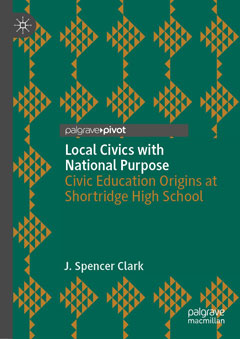March 2, 2021
College of Education faculty member publishes book on history of civic education curriculum

Spencer Clark, associate professor of curriculum studies in the Kansas State University College of Education's curriculum and instruction department, has authored a book that examines the development of civic education through the civic culture at Shortridge High School in Indianapolis, Indiana, and two individuals who fostered that development.
Clark's work, "Local Civics with National Purpose: Civic Education Origins at Shortridge High School," was recently published by Palgrave Macmillan. It documents the emergence of a vibrant approach to civic education from the 1880s through 1927. During this time, two faculty members at Shortridge, Laura Donnan and Arthur W. Dunn, played key roles in establishing an approach to civic education — one locally, and one nationally.
Donnan is known for her 1889 presentation at the National Education Association national conference in Nashville, Tennessee, that made an argument for requiring civic education in the high school curricula. She emphasized concepts that continue to be ambitious pedagogical approaches in classrooms today, including inquiry-based learning and place-based learning, among other methods. Many of these approaches were focused on developing her students' critical thinking skills and shaped by her personal activist experiences within the gendered ideological constraints of the era.
Dunn, also a faculty member at Shortridge for 10 years of Donnan's career, would eventually be named director of civic education at the Indianapolis Public Schools and hold other offices, including civic education specialist for the U.S. Bureau of Education. Clark notes that his time at Shortridge was critical to his career, which would be highlighted by his authoring of a nationally distributed textbook and the 1916 report, "The Social Studies in Secondary Education," which established the modern scope and sequence of the social studies curriculum.
"I felt it was especially important to recognize the role Donnan played in moving civic education forward, as she was virtually unknown outside of Chicago and Indianapolis," Clark said. "We can look back at Donnan's National Education Association presentation and see that she was attuned to innovation and well ahead of her time, as she instituted changes in her classroom that would become mandated 25 years later by men like Dunn. She developed a civic culture at Shortridge that was rooted in her own agency, resilience and gendered reality that was centered on civil rights as a forthright abolitionist and suffragette. She made student-centered learning with authentic outcomes a priority in her classroom, which is something we are still grappling with today. The continuation of her ideas, even approximately 130 years later, demonstrate her significance in the field of civic education."
Clark said he was especially excited to be able to share Donnan's story because it adds another perspective on Dunn's career and achievements, which had been researched and written about by numerous scholars — with no mention of Donnan's influence.
"I appreciated the opportunity to document the historic educational movements through the lens of Shortridge High School and illustrate many of the historic, and current, challenges in education that we discuss in my courses," Clark said.
Clark's research began more than 10 years ago and was funded in part by the K-State University Small Research Grant program. Clark teaches courses on curriculum theory, history of education, research methodology and social studies curriculum at K-State. His research examines the concept of agency in teacher education, history of education, civic and social studies education, and rural education. He is also director of the College of Education's Rural Education Center.
